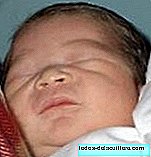
It is not a fact that should alarm, the researchers even state that the study should not be acted upon, but it is always good to know where the research moves.
The study published in Radiology suggests that 26% of babies born by natural birth experience mild cerebral bleeding, unlike babies born through caesarean section, in which this small hemorrhage is not recorded, we can logically think that it is caused by the tension generated during the baby's advance through the vaginal canal, but they claim that it has nothing to See the duration of labor, if it has been traumatic or if it has been assisted.
The research carried out by the University School of Medicine of North Carolina (USA), studied 88 newborns, of which 65 were born by natural birth. Two weeks after birth, the researchers performed high-resolution MRIs and found that a quarter of babies born by vaginal delivery showed a small intracranial hemorrhage, blood that was usually located in the lower back of the brain.
In babies born by caesarean section, although they were less in proportion, no signs of bleeding mentioned above were found.
It is worth highlighting an earlier British study in which they found that 10% of babies born by vaginal delivery experienced brain hemorrhages, which shows that there has been an increase in the percentages of babies suffering from this setback, but according to the radiologist of the Research, Dr. Keith Smith, is due to the accuracy of the images of the new work.
The researchers who carried out this work affirm that these previous data should not be conclusive to request cesarean deliveries, but we think that they should have remained silent until they elaborated the necessary studies that confirm and reliably demonstrate a conclusion about the effects they produce in The baby these mild brain hemorrhages. The dissemination of this news will only create alarm among the most susceptible couples by increasing the request for the number of caesarean sections.
We always indicate that many scientific studies of first instance end up being refuted by others with more rigor, we will be waiting for new news.












